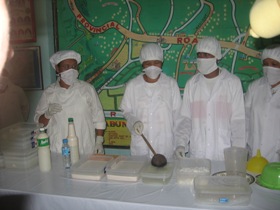| Laca Ginger Tea Processing Nata de Coco Production Malbog Dressmaking and Costume Hire Virgin Coconut Oil Youth Enterprise Jagna Porters Cooperative Seaweed Wholesaling Pottery Mattress Making |
Nata de Coco Community EnterpriseJagna, Bohol
Click here to view a 4 minute video about the development of the Nata de Coco enterprise Organizing workload, trying out production By rotating tasks and putting a little bit of effort in at slack times in their agricultural work, the group ‘evened out’ the workload across the year. No member gave up their subsistence farming or their other ‘sideline’ small, self-appropriating entrepreneurial activities. Instead, members relied on family and neighbours to substitute for them in production and marketing activities during busy times. Members also solicited donations of donations of coconuts from kin, the others in their farmers group and local patrons. And they and elicited purchase orders for a ‘proudly local fresh product’ from local stores where they had outstanding accounts, restaurants, and the organizers of social events. The group’s first small production for sale, in the Fiesta of 2005, was a success; they could not meet local demand and turned people away from their production site at the back of the NGO office. Despite setbacks, including vandalism of their fermentation room, they kept going because, “we’ve seen that there’s money to be made”. Money matters The group members put some of their earnings into the enterprise, but also took some as wages. Most then spent their wages either on transport, “special trips” -meaning visits to places that they could not normally afford, usually to follow up on papers for family members in government offices or seek medical care in the capital - or durable consumer goods, “clothes for the children…something that will last.” These expenditures redistributed the groups’ earning, reinvesting their profits into relations with those who had helped to make or wanted to consume the nata de coco. Group membership The group is currently struggling with the boundaries of ‘membership.’ Thus far, the members have been operating with a structure specified by the regulations of the Philippine Department of Labour. This structure makes the group eligible for government assistance and benefits, but stipulates one member per household. In the actual workings of the nata enterprise, however, the spouses of the members provide critical labour and resources. After some discussion, the group has decided that they should be considered ‘silent members’, in recognition that they are just as involved in the success of the group as the ‘full’ members. Eventually, the group hopes to adopt another structural form and expand its membership, including more of the people – kin and neighbours – involved in its now considerable production and marketing chains. This might include the other coconut farmers from whom they purchase coconuts at a discount, relatives who help by delivering orders to customers, children who take the place of their parents in production activities etc. Eventually, they hope to be able to offer some casual work to ‘jobless’ in their community. Benefits of involvement In interviews, group members spoke both about the benefits of additional cash income, but also the pleasures and challenges of working with the group within the community. They experienced a good feeling when buying coconuts from farmers who previously had few, if any market outlets, as well as a swell of pride when showcasing their local product to visitors. In the ongoing ups and downs of production and marketing, people reflected that they had developed creativity when confronted with problems, increased their work efficiency and built self-confidence in talking to others. Making and selling nata had required them to meet people from outside their usual circles and this challenge had helped them to discover ambition to succeed in local business. |
